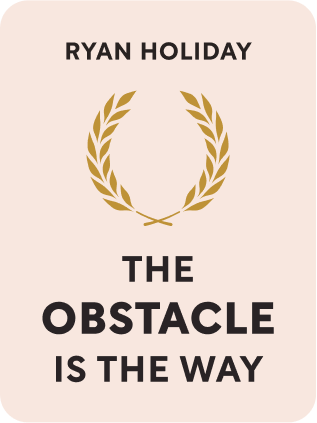

This article is an excerpt from the Shortform book guide to "The Obstacle Is The Way" by Ryan Holiday. Shortform has the world's best summaries and analyses of books you should be reading.
Like this article? Sign up for a free trial here .
What do you do when things don’t go your way? Do you ruminate about the what-ifs or do you focus on what you can control?
When life throws curveballs, many people get stuck in the dysfunctional patterns of thinking, ruminating about what happened, and imagining what would be if things turned out differently. But focusing on the things you can’t change wastes your energy and demoralizes the spirit. Instead, accept what is and focus on what you can control.
Here is how to reorient your thinking to focus on what you can control.
Focus on What You Can Control
There’s a 2,000-year-old Stoic phrase: “What is up to us, what is not up to us,” which means you must understand what’s within your power to change and what isn’t, and focus on what you can control.
For instance, you can’t control the economy, weather, disasters, or other people’s feelings and actions. But you can control your own attitude, emotions, judgments, and responses. You control how you see and respond to obstacles.
Pitcher Tommy John
Baseball pitcher Tommy John played for a remarkable 26 seasons in the majors. The key to his success was focusing every effort on what he could control and not being distracted by anything else.
For example:
- In the 1974 season, John damaged a ligament in the elbow of his pitching arm, normally a career-ending injury. However, he underwent an experimental surgery that offered him a one in 100 chance of playing again. He knew he could control two key success factors: rehab and training. He ended up winning 164 more games over 13 seasons. The procedure became known as Tommy John surgery.
- In 1988 at age 45, John was cut by the Yankees at the end of the season. But he believed there was still something he could do about it. He showed up at the next spring training as a walk-on, trained hard, and again made the team. He pitched the first game of the season and won.
John understood that focusing fully on what’s within your power increases your power. In contrast, focusing on things you can’t change wastes your energy and diminishes your power.
If an investor decides against funding your company, you can’t change that, but you can change your presentation so you’re successful the next time. If someone steals your idea or has the same one, you can’t change that, but you can make the idea better.
When you confront a challenge or obstacle, ask yourself. “What’s up to me and what isn’t up to me?” Then focus on what you can control. Once you accept what is and orient yourself towards things you can change, your life will turn around.
Reflect: Focus on What You Can Control
When you confront a challenge or obstacle, ask yourself. “What’s up to me and what isn’t up to me?” Then focus only on what you can control.
Describe a frustrating obstacle in your work or your personal life.
Which aspects are within your control and which aren’t? Which ones matter most?
What can you do about the important aspects within your control?

———End of Preview———
Like what you just read? Read the rest of the world's best book summary and analysis of Ryan Holiday's "The Obstacle Is The Way" at Shortform .
Here's what you'll find in our full The Obstacle Is The Way summary :
- Why you should think of any obstacles as opportunities
- How Stoicism can show you the way to overcome challenges
- How Theodore Roosevelt's struggle with asthma prepared him for future struggles







I learned this the hard way (and still forget it often enough when I’m in the midst of life’s drama). But whenever I notice that I’m getting worked up about something, the first thing I do is to consciously discern between what’s within my control, and what’s not. And then I look at the different things that are within my control, and try to figure out: which one of these matter the most? Which of these things are the most important ones? And then I do the best I can with those, and move on. I’ve done my best, time to move on. Whatever happens next is out of my hands. That gives me a lot more peace of mind.